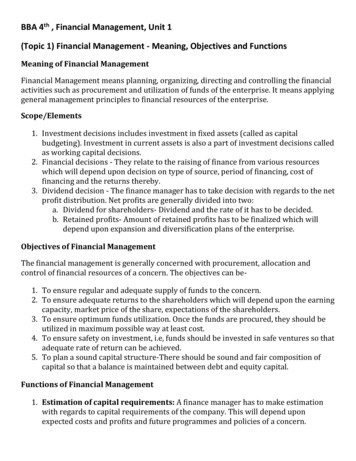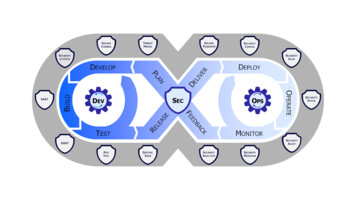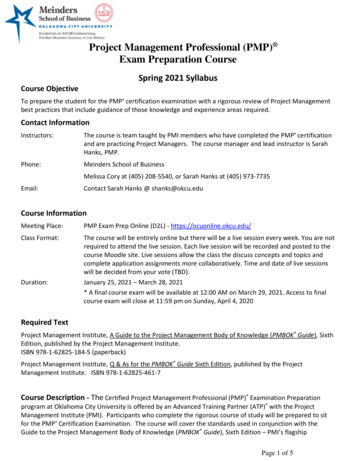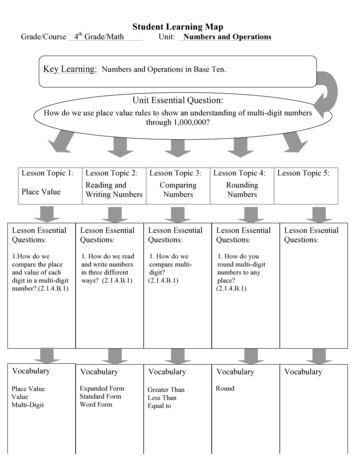
Transcription
BBA 4th , Financial Management, Unit 1(Topic 1) Financial Management - Meaning, Objectives and FunctionsMeaning of Financial ManagementFinancial Management means planning, organizing, directing and controlling the financialactivities such as procurement and utilization of funds of the enterprise. It means applyinggeneral management principles to financial resources of the enterprise.Scope/Elements1. Investment decisions includes investment in fixed assets (called as capitalbudgeting). Investment in current assets is also a part of investment decisions calledas working capital decisions.2. Financial decisions - They relate to the raising of finance from various resourceswhich will depend upon decision on type of source, period of financing, cost offinancing and the returns thereby.3. Dividend decision - The finance manager has to take decision with regards to the netprofit distribution. Net profits are generally divided into two:a. Dividend for shareholders- Dividend and the rate of it has to be decided.b. Retained profits- Amount of retained profits has to be finalized which willdepend upon expansion and diversification plans of the enterprise.Objectives of Financial ManagementThe financial management is generally concerned with procurement, allocation andcontrol of financial resources of a concern. The objectives can be1. To ensure regular and adequate supply of funds to the concern.2. To ensure adequate returns to the shareholders which will depend upon the earningcapacity, market price of the share, expectations of the shareholders.3. To ensure optimum funds utilization. Once the funds are procured, they should beutilized in maximum possible way at least cost.4. To ensure safety on investment, i.e, funds should be invested in safe ventures so thatadequate rate of return can be achieved.5. To plan a sound capital structure-There should be sound and fair composition ofcapital so that a balance is maintained between debt and equity capital.Functions of Financial Management1. Estimation of capital requirements: A finance manager has to make estimationwith regards to capital requirements of the company. This will depend uponexpected costs and profits and future programmes and policies of a concern.
Estimations have to be made in an adequate manner which increases earningcapacity of enterprise.2. Determination of capital composition: Once the estimation have been made, thecapital structure have to be decided. This involves short- term and long- term debtequity analysis. This will depend upon the proportion of equity capital a company ispossessing and additional funds which have to be raised from outside parties.3. Choice of sources of funds: For additional funds to be procured, a company hasmany choices likea. Issue of shares and debenturesb. Loans to be taken from banks and financial institutionsc. Public deposits to be drawn like in form of bonds.Choice of factor will depend on relative merits and demerits of each source andperiod of financing.4. Investment of funds: The finance manager has to decide to allocate funds intoprofitable ventures so that there is safety on investment and regular returns ispossible.5. Disposal of surplus: The net profits decision have to be made by the financemanager. This can be done in two ways:a. Dividend declaration - It includes identifying the rate of dividends and otherbenefits like bonus.b. Retained profits - The volume has to be decided which will depend uponexpansional, innovational, diversification plans of the company.6. Management of cash: Finance manager has to make decisions with regards to cashmanagement. Cash is required for many purposes like payment of wages andsalaries, payment of electricity and water bills, payment to creditors, meetingcurrent liabilities, maintainance of enough stock, purchase of raw materials, etc.7. Financial controls: The finance manager has not only to plan, procure and utilizethe funds but he also has to exercise control over finances. This can be done throughmany techniques like ratio analysis, financial forecasting, cost and profit control, etc.(Topic 2) Role and Function of Financial Manager1. Estimating Financial Requirements: The first task of any financial manager is todetermine short-term and long-term financial requirement of his/her business. Forthis purpose, the financial manager will prepare a financial plan for the present aswell as future. The amount required for purchasing fixed assets as well as the needsof funds for the working capital has to be adequately estimated.
2. Deciding Capital Structure: The capital structure refers to the kind and proportionof the different securities for raising funds. After deciding on the quantum of fundsrequired it should be determined which type of security should be built. Financingfixed securities through long-term debts may be wise. Long-term funds should beemployed to finance working capital also.3. Selecting a Source of Finance: After preparing a capital structure, an appropriatesource of finance is selected. Various sources from which finance may be raised,includes share capital, debentures, commercial deposits, etc.4. Selecting a Pattern of Investment: When fund have been procured, then a decisionabout investment pattern is to be taken. The selection of investment pattern isrelated to the use of the funds. A decision has to be taken as to which assets are to bepurchased? The fund will have to be spent first. Fixed asset and the appropriateportion will be retained for the working capital.5. Proper Cash Management: Cash management is an essential task of afinancial manager. He has to assess the various cash needs at different times andthen make arrangements for arranging cash. Cash may be required to makepayments to creditors, purchasing raw material, meet wage bills and meet day today expenses.(Topic 3) profit vs. wealth maximizationPROFIT MAXIMIZATIONProfit Maximization is the traditional approach, in this process Companies undergo toDetermine the best Output and price levels in order to maximize its return. The company willusually adjust influential factors such as production costs, sale price, and output levels as away of reaching its profit goal. The overall objective of business enterprises to earn at leastsatisfactory returns on the funds invested to sustain in the market for long periods.WEALTH MAXIMIZATIONWealth maximization is almost universally accepted and appropriate goal of a firm. Accordingto wealth maximization, the managers should take decisions that maximize the net presentvalue of the shareholders or shareholders’ wealth. The wealth maximization principle impliesthat the fundamental objective of a firm is to maximize the market value of its shares.
PROFIT MAXIMIZATIONWEALTH MAXIMIZATIONProfit Maximization is based on the increase of salesand profits of the organization.Wealth Maximization is based on the cash flows intothe organization.Focused OnProfit Maximization emphasizes on short term goals.Wealth Maximization emphasizes on long term goals.Time Value of MoneyProfit Maximization ignores the time value of money.Time value of money refers the money receivabletoday is more valuable than the money which is goingto be recieved in future.Wealth Maximization considers the time value ofmoney. In wealth maximization, the future cash flowsare discounted at an suitable discounted rate torepresent their present value.RiskWealth Maximization considers the risk anduncertainty.Profit Maximization ignore the risk and uncertainity.ReliabilityIn the new business environment Profit maximisationis regarded as unrealistic, difficult, inappropriate andimmoral.Wealth maximisation objectives ensures fair return tothe shareholders, reserve funds for growth andexpansion, promoting financial discipline in themanagement.ObjectiveProfit Maximization objective leads to exploitingemployees and consumers. it also leads to inequalitiesand lowers human values.Wealth Maximization provides efficient allocation ofresource, It ensures the economic interest of thesociety.
(Topic 2) Role and Function of Financial Manager 1. Estimating Financial Requirements: The first task of any financial manager is to determine short-term and long-term financial requirement of his/her business. For this purpose, the financial manager will prepare a financial plan for the present as well as future.










